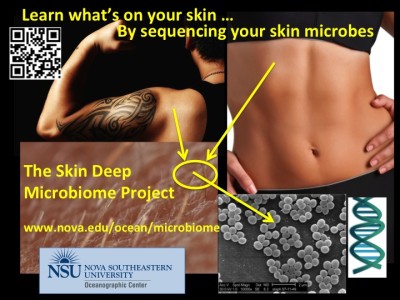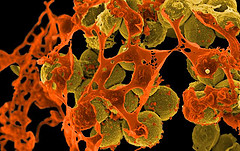NSU Newsroom
SharkBytes
Horizons
This version of NSU News has been archived as of February 28, 2019. To search through archived articles, visit nova.edu/search. To access the new version of NSU News, visit news.nova.edu.
This version of SharkBytes has been archived as of February 28, 2019. To search through archived articles, visit nova.edu/search. To access the new version of SharkBytes, visit sharkbytes.nova.edu.
NSU Researchers Embark on Study That Focuses on the Microbes Found on Human Skin – and YOU can Take Part!
Online Crowdfunding Research Project Seeking Test Subjects and/or Donors
www.nova.edu/ocean/microbiome
FOR T LAUDERDALE-DAVIE, Fla. – Pop Quiz: what is the largest organ in the human body? If you said your skin, you are correct!
T LAUDERDALE-DAVIE, Fla. – Pop Quiz: what is the largest organ in the human body? If you said your skin, you are correct!
As the old saying goes: “beauty is skin deep.” Researchers at Nova Southeastern University’s Oceanographic Center have taken that sentiment one step further, as they believe that certain knowledge may be skin deep, and they’ve used that old adage for their new study: “The Skin Deep Microbiome Project.”
This is a unique study that is focused entirely on the human skin and what may be living there. What makes it even more interesting is that researchers who normally look at life under the surface of the ocean are turning their attention to landlubbers, specifically, us.
“Our lab has been focused on multiple types of symbiotic relationships – mostly from the sea (sponges, corals etc), for a number of years,” said Joe Lopez, Ph.D., a professor and researcher at NSU. “However, there is a continuum from sea to land, and humans also host their own unique and diverse ‘microbial symbionts.’ These are being studied by the NIH’s Human Microbiome Project, and with this new NSU project, we aim to extend these earlier efforts by conducting a broad, unbiased survey based on volunteer crowd-funding donors.”
The idea is simple – there have not been many studies on the microbiology focused exclusively on the human skin. This project will cast a wide net locally, nationally and then internationally to request enough samples and funding for a statistically sound study.
Next generation DNA sequencing and bioinformatics will identify which microbes may live on human skin and allow study of any variations based on various factors, such as: geography, age, ethnic background, smoking, use of anti- or probiotics, frequenting a tanning bed or having tattoos.
To get things rolling, Lopez and his colleagues created an online funding Website for this project. He said this study is very easy for people to participate in and he hopes it attracts several hundred people interested in being part of a scientific study.
Unlike the movie character Goldmember from the Austin Power’s franchise, you don’t need a “skin box” where you stockpile pieces of your skin (gross!) – you just need 60 seconds and a special Q-tip swab, which NSU will provide. In fact, taking part in this study is very easy.
First, those interested need to visit the study’s page online (www.nova.edu/ocean/microbiome). There, they will find all the information needed – from the donation/participation levels to directions on how to provide skin samples to an FAQ page.

Methicillin-resistant Staphylococcus aureus (MRSA) Bacteria
“We’re looking for around 200 or more diverse people – from anywhere and at any age – to participate, but we also are hoping people will support the study with a financial gift even if they don’t want to provide a sample,” Lopez said. “We’re truly thankful for all our benefactors and hopefully this new, exciting project will reach even more who are interested in supporting scientific research.”
Here’s a fact – no matter how hard you try, and no matter what type of soap or disinfectant you use, bacterial and other microbes can be found on our skin. And contrary to popular belief or the latest ad from Madison Avenue, nearly all of the microbes are either benign or good for our health. Lopez said that while situationally (e.g. hospitals) the use of sterilants and hand sanitizers is appropriate, using these all the time can actually result in adverse health effects.
“Most microbes, including symbionts that live on our skin, are harmless,” said Lopez. “They protect us by occupying niche space and outcompeting potential pathogens. We need to better understand how these bacteria are good for us.”
While these microbes are all around us, we need to collect samples to conduct the research Lopez and his colleagues have in mind.
“Microbes (bacteria, fungi, etc.) are everywhere – they are the unseen majority,” Lopez said. “Most of them cannot be grown in the laboratory, which is why we have to use special, indirect methods such as Next Generation DNA sequencing technologies to identify and characterize this majority.”
###
About Nova Southeastern University: Situated on 314 beautiful acres in Ft. Lauderdale, Florida, Nova Southeastern University (NSU) is a dynamic research institution dedicated to providing high-quality educational programs at all levels. NSU is an independent, not-for-profit institution with 26,000 students at campuses in Fort Lauderdale, Fort Myers, Jacksonville, Miami, Orlando, Palm Beach and Tampa, Florida as well as San Juan, Puerto Rico. NSU awards associate’s, bachelor’s, master’s, specialist, doctoral and first-professional degrees in a wide range of fields. NSU is classified as a research university with “high research activity” by the Carnegie Foundation for the Advancement of Teaching, and it is one of only 37 universities nationwide to also be awarded Carnegie’s Community Engagement Classification. For more information, please visit www.nova.edu. Celebrating 50 years of academic excellence!
About NSU’s Oceanographic Center: The Oceanographic Center provides high-quality graduate education programs (i.e. master’s, doctoral, certificate) in a broad range of marine science disciplines. Center researchers carry out innovative, basic and applied marine and research programs in coral reel biology, ecology, and geology; fish biology, ecology, and conservation; shark and billfish ecology; fisheries science; deep sea organismal biology and ecology; invertebrate and vertebrate genomics, genetics, molecular ecology, and evolution; microbiology; biodiversity; observation and modeling of large scale ocean circulation, coastal dynamics, and ocean atmosphere coupling; benthic habitat mapping; biodiversity; histology; and calcification. For more information, please visit http://www.nova.edu/ocean